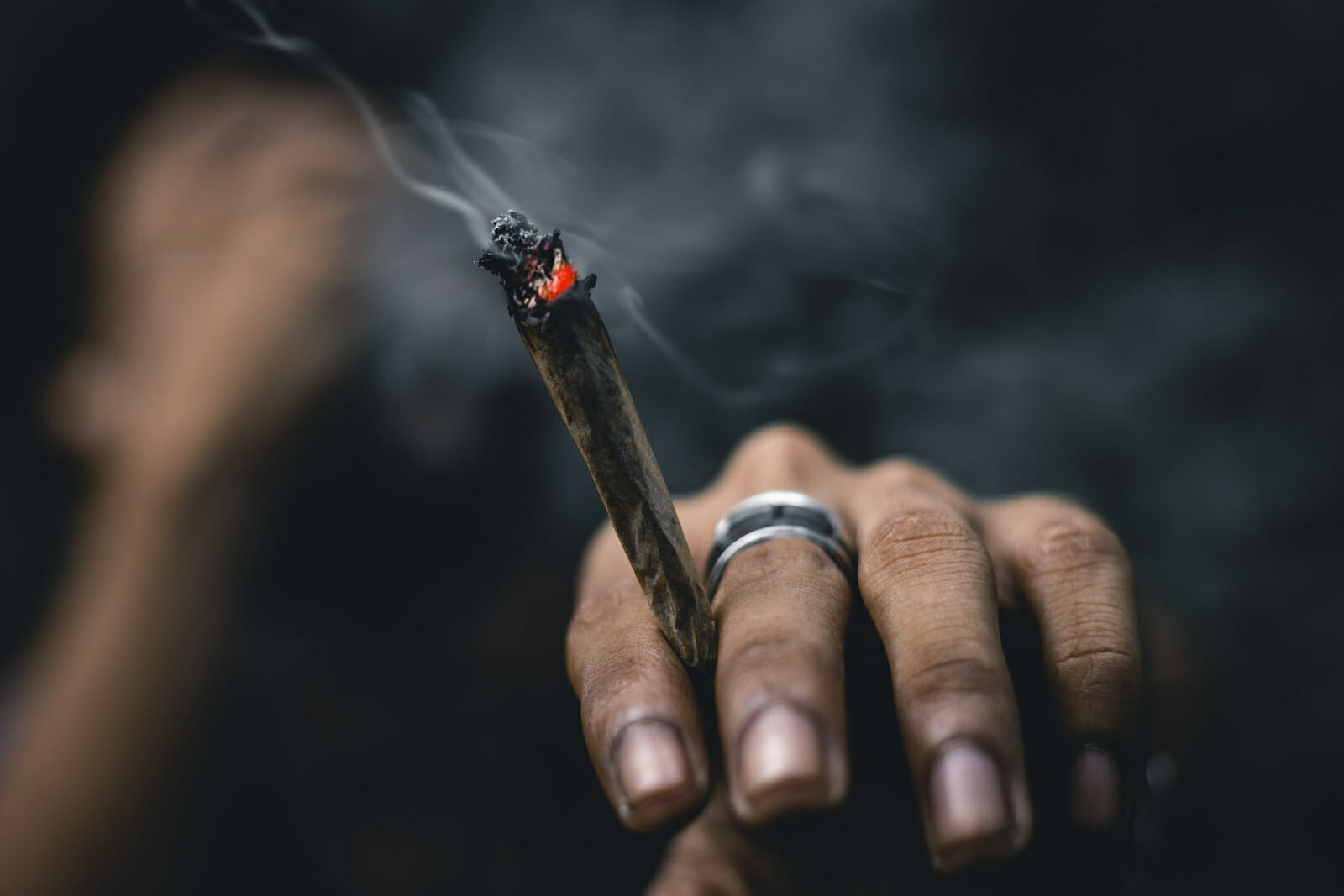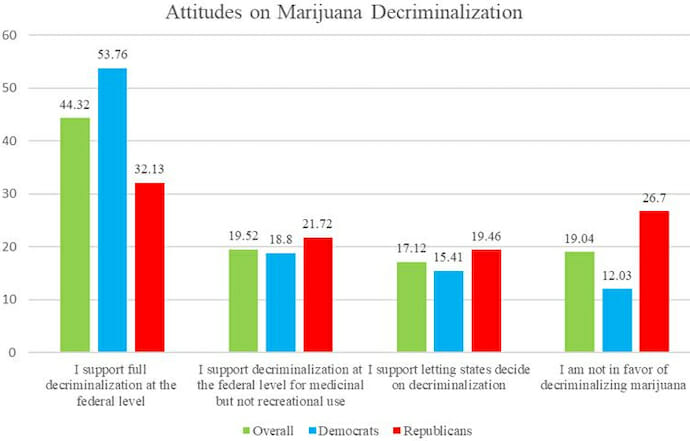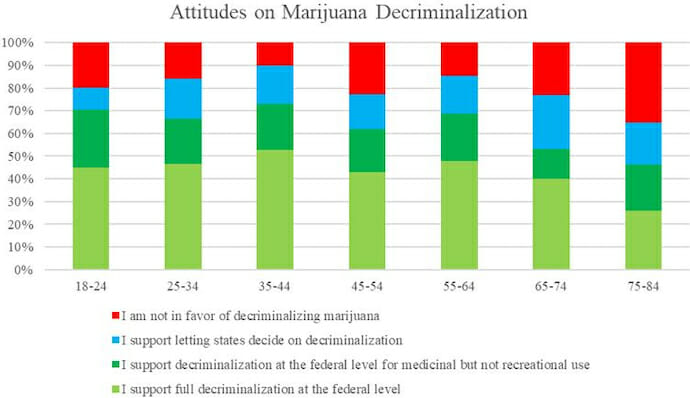
Public Opinion on Marijuana is Shifting, But What Does that Mean for Legalization?
Though public opinion has increasingly favored decriminalization of marijuana use in the last two decades, the process has been complicated by the public’s differing opinions on how marijuana should be decriminalized and for what reasons. While on a national level, marijuana distribution for any use is illegal under the Controlled Substances Act, 36 U.S. states have passed measures allowing for medicinal use, while 18 states have permitted recreational use as of June 22. A 2018 poll found that 56% of adults surveyed favored the state regulation of marijuana over federal regulation, highlighting that some wish for states to be given autonomy over decisions regarding decriminalization.
However, every state that decriminalizes marijuana for any reason sustains an “uneasy relationship” with the federal government. The federal government is unable and partly unwilling to enforce marijuana criminalization in all 36 states in which it is legal, but businesses wishing to sell marijuana encounter problems with federal tax laws, banking, and the threat of arrest if the federal government decides to crackdown. Supreme Court Justice Clarence Thomas recently criticized the federal government’s approach to marijuana, saying it “simultaneously tolerates and forbids local use of marijuana” after a Colorado business appealed a ruling prohibiting the business from deducting business expenses from its federal taxes.
With public opinion in support of decriminalization, the complexity of the federal government’s relationship with marijuana may be too difficult to preserve. On June 14, Senate Majority Leader Chuck Schumer introduced the Cannabis Administration and Opportunity Act that would legalize marijuana nationally, but passage faces challenges in both parties along with President Biden being more supportive of decriminalization than legalization.
Public opinion research increasingly finds support for legalization in some form, with a 2021 Pew Research Center survey finding that 90% of Americans believe marijuana should be legalized for medical use, and 60% favored legalization for both recreational and medical use. In contrast, only 12% supported legalization in 1969 and 31% in 1999. Medical use remains the primary reason listed for legalization according to a 2019 Gallup poll and this focus may explain the challenges to full decriminalization. Likewise, a 2018 study suggests the media focus on medical use may explain why around 30% of Americans surveyed support legalization for medicinal but not recreational use. Meanwhile, few studies directly ask whether legalization should be left up to the states.
To assess public opinion on decriminalizing marijuana, we conducted a national online survey of 625 Americans, using quota sampling and administered through Qualtrics on June 22-24. Participants were asked “Which of the following best matches your opinion regarding marijuana?” and could choose one of four answers:
1. I support full decriminalization at the federal level.
2. I support decriminalization at the federal level for medicinal but not recreational use.
3. I support letting states decide on decriminalization.
4. I am not in favor of decriminalizing marijuana.
 Overall, 44.32% of those surveyed favored full decriminalization, with another 19.52% favoring decriminalization just for medicinal use. If we assume those supportive of full decriminalization would also support just medicinal use decriminalization, we see clear majorities in support of some form of legalization. In contrast, only 19.04% expressed opposition to decriminalizing for any use. In addition, 17.12% of participants selected letting states decide on decriminalization, echoing Clarence Thomas’ sentiments that the federal government’s criminalization of marijuana is too ineffective to be necessary. Since over half of states have at least decriminalized marijuana for medicinal use, it is more likely that full decriminalization will be achieved faster in states than through federal legislation. Supporting states’ discretion on decriminalization could be a strategic move for those who want full decriminalization now.
Overall, 44.32% of those surveyed favored full decriminalization, with another 19.52% favoring decriminalization just for medicinal use. If we assume those supportive of full decriminalization would also support just medicinal use decriminalization, we see clear majorities in support of some form of legalization. In contrast, only 19.04% expressed opposition to decriminalizing for any use. In addition, 17.12% of participants selected letting states decide on decriminalization, echoing Clarence Thomas’ sentiments that the federal government’s criminalization of marijuana is too ineffective to be necessary. Since over half of states have at least decriminalized marijuana for medicinal use, it is more likely that full decriminalization will be achieved faster in states than through federal legislation. Supporting states’ discretion on decriminalization could be a strategic move for those who want full decriminalization now.
Meanwhile, predictably we find decriminalization is popular among Democrats, yet even a majority of Republicans support decriminalization under certain circumstances, suggesting that federal legislation to decriminalize marijuana for medicinal use may have bipartisan support. In addition, unlike assumptions that decriminalization is generational, we find majorities support some form of decriminalization across all age groups from 18-74, with nearly half of those over 75 supportive as well. This shows that support for decriminalization is not simply generational but reflects a broader cultural shift in attitudes.
 Why has public opinion shifted to embrace the decriminalization of marijuana for medicinal and recreational use? One explanation could be the lucrative nature of the marijuana industry. A 2021 MJBiz study reported that the marijuana industry is expected to add $92 billion to the U.S. economy and at least $160 billion by 2025. Additionally, local and state tax revenue from marijuana sales funds government services; Nevada is projected to return $1,917 per person from marijuana tax revenue in 2021. Full federal decriminalization may be the first step for the U.S. to capitalize on the benefits of the marijuana market.
Why has public opinion shifted to embrace the decriminalization of marijuana for medicinal and recreational use? One explanation could be the lucrative nature of the marijuana industry. A 2021 MJBiz study reported that the marijuana industry is expected to add $92 billion to the U.S. economy and at least $160 billion by 2025. Additionally, local and state tax revenue from marijuana sales funds government services; Nevada is projected to return $1,917 per person from marijuana tax revenue in 2021. Full federal decriminalization may be the first step for the U.S. to capitalize on the benefits of the marijuana market.
Additionally, public outrage over the recent disqualification of sprinter Sha’Charri Richardson from the Olympics after she tested positive for marijuana use shows how recreational use of marijuana has become less stigmatized. In the 2019 National Survey on Drug Use and Health, 46% reported that they had used marijuana in their lifetime recreationally, which could be a driving factor of support for full decriminalization.
Though full decriminalization is rising in popularity, federal decriminalization for medicinal use is currently more feasible. With bipartisan support, federal medicinal decriminalization is a policy that could pass through Congress should it be introduced. However, this allows for a loophole to be exploited for recreational marijuana use. Decriminalization for medicinal use is popular enough among the public for this loophole to be accepted, and medicinal decriminalization of marijuana is likely the first step to full decriminalization federally if public opinion continues to increase in support.


